
Vox is a British musical equipment manufacturer founded in 1957 by Thomas Walter Jennings in Dartford, Kent, England. The company is most famous for making the Vox AC30 guitar amplifier, used by The Beatles, The Rolling Stones, The Kinks, The Yardbirds, Queen, Dire Straits, U2, and Radiohead; the Vox Continental electric organ, the Vox wah-wah pedal used by Jimi Hendrix, and a series of innovative electric guitars and bass guitars. Since 1992, Vox has been owned by the Japanese electronics firm Korg.

Marshall Amplification is a British company that designs and manufactures music amplifiers and speaker cabinets. Founded in London by shop owner and drummer Jim Marshall, the company is based in Bletchley, Milton Keynes, England. Since March 2023, Marshall Amplification has been one of several divisions of the Swedish conglomerate, the Marshall Group.

Mesa/Boogie is an American company in Petaluma, California, that manufactures amplifiers and other accessories for guitars and basses. It has been in operation since 1969.
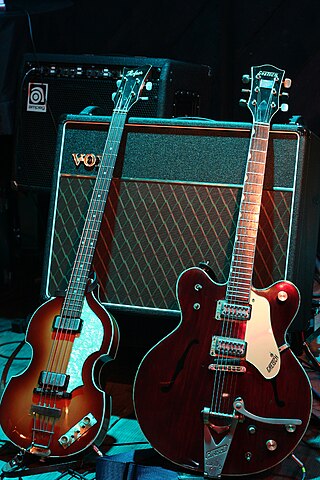
The Vox AC30 is a guitar amplifier manufactured by Vox. It was introduced in 1958 to meet the growing demand for louder amplifiers. Characterised by its "jangly" high-end sound it has become widely recognized by British musicians and others, such as George Harrison and John Lennon of the Beatles, Bill Wyman of the Rolling Stones, Brian May of Queen, Dave Davies of the Kinks and Hank Marvin.

A bass amplifier is a musical instrument electronic device that uses electrical power to make lower-pitched instruments such as the bass guitar or double bass loud enough to be heard by the performers and audience. Bass amps typically consist of a preamplifier, tone controls, a power amplifier and one or more loudspeakers ("drivers") in a cabinet.

The Fender Twin and Twin Reverb are guitar amplifiers made by Fender Musical Instruments Corporation. The Twin was introduced in 1952, two years before Fender began selling Stratocaster electric guitars. The amps are known for their characteristically clean tone.
AHED was a Canadian company owned by Phil G. Anderson that produced guitar amplifiers, as well as guitars. Its main product line was the GBX amplifier, which could reach 180 watts with 4x10", 4x12" or 2x15" speakers. The GBX amplifier had a pre-amplifier that could change the gain, brilliance, depth, contour and response of the output.

The Fender Hot Rod Deluxe is a guitar amplifier manufactured and sold by the Fender Musical Instruments Corporation. It was introduced in 1996 as part of the "Hot Rod" line of guitar amplifiers and has been in continuous production since. The Hot Rod Deluxe is a modified version of the Fender Blues Deluxe from the earlier Blues line of amplifiers, and has a higher level of gain in its preamplification signal. This model, along with the Hot Rod Deville, were originally designated as F.A.T. amplifiers but this moniker was dropped in 2002 when production of this series of amps was moved from Corona, CA to Fender's Baja-Ensenada, Mexico manufacturing facility.
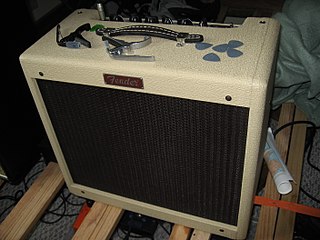
The Blues Junior is a tube guitar amplifier introduced in 1995 by the Fender Musical Instrument Corporation. It is aimed at achieving the warm, tube-driven tone common in many styles of American blues and blues rock dating back to the 1950s, while remaining both portable and affordable. A popular amp, Fender have released numerous versions since its initial release, the most recent being the version IV in 2018. Fender also frequently releases limited editions of the Blues Junior, such as the Lacquered Tweed and the "80 Proof".

The Epiphone Valve Junior is a small 5 watt class A electric guitar amplifier.

The Fender Bassman is a series of bass amplifiers introduced by Fender during 1952. Initially intended to amplify bass guitars, musicians used the 5B6 Bassman to amplify other instruments, including electric guitars, harmonicas, and pedal steel guitars. Besides being a popular and important amplifier in its own right, the Bassman also became the foundation on which Marshall and other companies built their high-gain tube amplifiers.
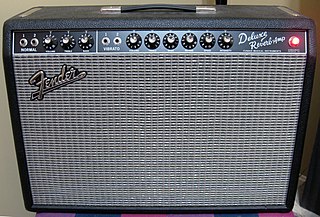
The Fender Deluxe Reverb is a guitar amplifier made by the Fender Electric Instrument Company and its successors. It was first introduced in 1963 by incorporating an onboard spring reverb tank to the newly redesigned Fender Deluxe amplifier.
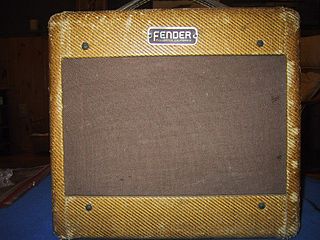
The Fender Champ was a guitar amplifier made by Fender. It was introduced in 1948 and discontinued in 1982. An updated version was introduced in 2006 as part of the "Vintage Modified" line.
The Fender Bandmaster Reverb was a tube amplifier made by Fender. It was primarily a Silverface Bandmaster piggyback 'head' with the addition of reverb and vibrato and a modified circuit that shared more similarities with other Fender amplifiers. It was introduced in 1968 and was discontinued in 1980 .The Bandmaster Reverb was produced in both a 40 watt and 70 watt tube variant, before being reissued as a vintage modified amplifier.
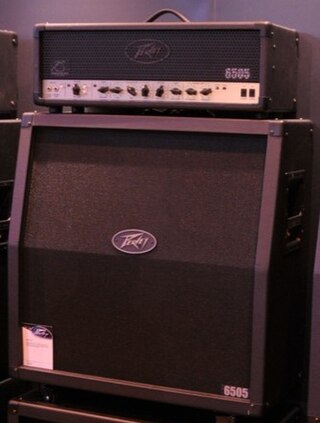
The Peavey 5150 is a vacuum tube based guitar amplifier made by Peavey Electronics from 1992 on. The amplifier was initially created as a signature model for Eddie Van Halen. After Van Halen and Peavey parted ways in 2004, the name was changed to Peavey 6505 in celebration of Peavey's 40th anniversary (1965–2005). The 5150 name was used again by Van Halen in partnership with Fender under the EVH brand in 2007 and 2011.

The Fender Princeton Reverb is a guitar amplifier combo. It is based on the Princeton and includes built-in reverb and vibrato.

The Mesa/Boogie Mark Series is a series of guitar amplifier made by Mesa Engineering. Originally just referred to as "Boogies", the product line took on the moniker "Mark Series" as newer revisions were put into production. The Mark Series amplifier was Mesa's flagship product until the introduction of the Rectifier series, and the amplifiers are collectable.
The Fender Deluxe guitar amplifier is a range of non-reverb guitar amplifiers produced by Fender. The amplifiers were originally produced from early 1948 to 1966 and reissues are in current production. Its predecessor was the Fender Model 26 "Woodie" produced from 1946 to 1948.
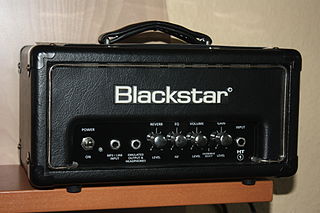
Blackstar Amplification is a British company that produces and manufacturers guitar amplifiers and effects units. The company was founded by a group of ex-Marshall employees, most notably Bruce Keir, who became technical Director at Blackstar, and former Chief Design Engineer at Marshall, Ian Robinson. In 2009 the company began operations in the United States. The majority of the research and development for Blackstar is carried out in the UK. Blackstar is endorsed by major artists like Ozzy Osbourne, Neal Schon, Opeth, and Richie Sambora of Bon Jovi. Blackstar has been consistently ranked amongst the best amplification brands by leading guitarists. Bruce Keir died in September 2021 at the age of 60.

Traynor is a brand of bass amplifiers and guitar amplifiers, the first brand formed by Yorkville Sound. The Traynor brand, named for founder Peter Traynor, began in 1963 with the Dynabass bass amplifier, a rental product. Traynor first became popular in Canada by providing less expensive versions of the circuits used in Marshall and Fender amplifiers of the time. The revived brand now produces a wide range of electric, acoustic, and bass guitar amps.


















